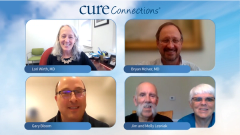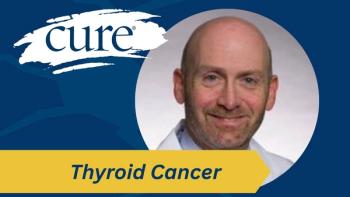
Differentiated Thyroid Cancer: The Role of Patient Advocacy Organizations
Considerations for the role of patient advocacy groups and patient-to-patient education in the differentiated thyroid cancer journey.
Episodes in this series

Transcript:
Lori Wirth, MD: I think that one of the reasons that a multidisciplinary team is so important is because our patients really need a lot of support. I want to turn to Gary, in terms of the roles that organizations like ThyCa [Thyroid Cancer Survivors’ Association] can have in providing support for this particular patient population. Gary, maybe you could describe ThyCa a little bit, and talk about the role of the organization.
Gary Bloom: Lori, I’d like to thank you for asking. ThyCa provides education and support for patients. We do that over a spectrum beginning with pre-diagnosis, but ideally when we meet people. Then we hopefully can be there to support them through understanding what their care can be. We don’t provide medical advice because that’s not our role. We’re not physicians. We are patients, we are caregivers, and so our role is to share the experiences that we’ve had. This is mostly to explain what we’ve been through with the idea that people can have an appreciation for what may be in front of them, and then they can work at better understanding that which Dr McIver has so eloquently and comfortably explained to us. When we first go through our experience of being told we have cancer, and I’m sure Jim [patient] can verify this, it feels like someone’s punched you in the stomach; you double over and your ears suddenly stop working. After that, Dr McIver may be talking so very gently to us, and we hear nothing. If Molly’s not in the room to be that second set of ears, we as a patient walk out and go home, and if someone asks what happened, you say, “I don’t know.” ThyCa wants to fill that position of being that second set of ears in the room, even when we’re not in the room. We can be an environment where people can really learn about what they may have experienced when they were with their doctor and get more clarification with the idea of becoming more knowledgeable and prepared patients for subsequent appointments with their doctors.
Lori Wirth, MD:I think it’s very helpful also for patients to have non-doctors to turn to, to hear about whatever illness or whatever cancer they’ve recently been diagnosed with. Of course, Bryan and I feel like we can really explain all about thyroid cancer, but that’s certainly from the provider’s perspective and it’s not the lived perspective at all. I think that there’s so much information that people who’ve lived through the experience can really provide, and organizations like ThyCa can make that happen. Gary, ThyCa has support groups, right?
Gary Bloom: Yes, and through the pandemic, the construct of our support groups has changed dramatically. We used to have about 100 groups that met face-to-face throughout the month, and now we have just shy of 40 groups that are meeting virtually on a monthly basis. We actually do have 3 groups that have gone back to face-to-face meetings. The nice thing about the virtual groups is that people can go to any support group; they don’t have to go to the one down the street from them. It’s created a very different environment for connecting with people because you just never know who is going to show up into your meeting. In addition to the support groups, we have online support environments. We have something called Inspire, which is a very large online community, and then we have a number of different Facebook groups that we work with that are all by log in, and you have to be approved to get in. It’s very private and it’s another way for people to share. I’m a big believer that any environment where people can share what they’re going through is going to help them get through their journey. You used a phrase, garden variety, and while we wish everyone had a garden variety diagnosis and thus journey probably, you both know as physicians that unfortunately that’s not true.
Even those of us who go through, as Bryan called it, the good cancer, we don’t always have a good cancer reaction to our experience, and this includes the idea that so many of our people really are confused in the beginning because the doctor who has diagnosed them has told them if you have to have cancer, this is the one to get. Then, as a patient, I’m not really ready for what may come as a next step. When you were told it’s going to be a good journey, that should be a surgery, maybe radioactive iodine. Then you’re given a pill, your thyroid hormone, and life is going to be hunky dory. As Jim [patient] is going to tell us, unfortunately that isn’t always the case.
Bryan McIver, MD: If it’s OK, just before Jim [patient] does, can I just weigh in and say one thing? Gary, I couldn’t agree more. The message for a patient starting a journey with thyroid cancer needs to understand that there are sometimes potholes in the road, and twists and turns in that road that is going to make it more complex than just a garden variety. I’m an enthusiast for honesty when we first interact with patients. We should never sugar coat the diagnosis, and we should never do anything other than explain to a patient and educate them or inform what that journey is going to look like and feel like. That’s from the outset all the way through to, hopefully, ultimately long-term stable remission and boredom, because we get bored following these cancers after they’ve been gone for so many years. However, to start the journey with overly reassuring somebody and not letting them know what that journey looks like, I think we do our patients a grave disservice. One of the things that you have done over the time you’ve been organizing ThyCa is to provide another educational opportunity for patients who can read, learn, and meet with people and really understand what that journey looks like. I want to thank you for your role in that over the years.
Lori Wirth, MD: Just one last comment before reaching out to Jim [patient], a person commented. I think the garden variety thyroid cancers, a small papillary thyroid cancer that might be treated with surgery, thyroid hormone suppression, plus or minus radioactive iodine isn’t necessarily an easy cancer, either. I think it’s really important to recognize that as well. These cancer diagnoses have major impacts on people’s lives at all of the various stages for sure.
Transcript edited for clarity.





